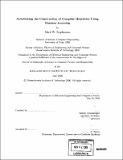Automating the construction of a complier heuristics using machine learning
Author(s)
Stephenson, Mark William, 1975-
DownloadFull printable version (16.31Mb)
Other Contributors
Massachusetts Institute of Technology. Dept. of Electrical Engineering and Computer Science.
Advisor
Saman Amarasinghe.
Terms of use
Metadata
Show full item recordAbstract
Compiler writers are expected to create effective and inexpensive solutions to NP-hard problems such as instruction scheduling and register allocation. To make matters worse, separate optimization phases have strong interactions and competing resource constraints. Compiler writers deal with system complexity by dividing the problem into multiple phases and devising approximate heuristics for each phase. However, to achieve satisfactory performance, developers are forced to manually tweak their heuristics with trial-and-error experimentation. In this dissertation I present meta optimization, a methodology for automatically constructing high quality compiler heuristics using machine learning techniques. This thesis describes machine-learned heuristics for three important compiler optimizations: hyperblock formation, register allocation, and loop unrolling. The machine-learned heuristics outperform (by as much as 3x in some cases) their state-of-the-art hand-crafted counterparts. By automatically collecting data and systematically analyzing them, my techniques discover subtle interactions that even experienced engineers would likely overlook. In addition to improving performance, my techniques can significantly reduce the human effort involved in compiler design. (cont.) Machine learning algorithms can design critical portions of compiler heuristics, thereby freeing the human designer to focus on compiler correctness. The progression of experiments I conduct in this thesis leads to collaborative compilation, an approach which enables ordinary users to transparently train compiler heuristics by running their applications as they normally would. The collaborative system automatically adapts itself to the applications in which a community of users is interested.
Description
Thesis (Ph. D.)--Massachusetts Institute of Technology, Dept. of Electrical Engineering and Computer Science, 2006. Includes bibliographical references (p. 153-162).
Date issued
2006Department
Massachusetts Institute of Technology. Department of Electrical Engineering and Computer SciencePublisher
Massachusetts Institute of Technology
Keywords
Electrical Engineering and Computer Science.